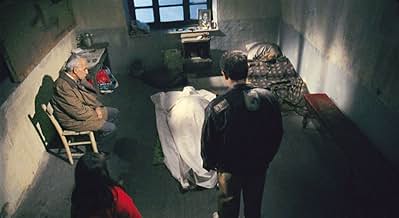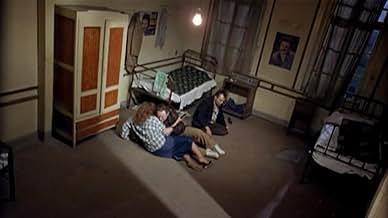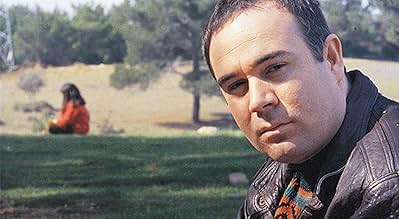Masumiyet
- 1997
- 1h 50m
ÉVALUATION IMDb
8,1/10
21 k
MA NOTE
Ajouter une intrigue dans votre langueYusuf is released from prison after serving a ten-year sentence. He is scared of life outside as he goes to an address given to him by another prisoner.Yusuf is released from prison after serving a ten-year sentence. He is scared of life outside as he goes to an address given to him by another prisoner.Yusuf is released from prison after serving a ten-year sentence. He is scared of life outside as he goes to an address given to him by another prisoner.
- Prix
- 20 victoires et 2 nominations au total
Yalcin Cakmak
- Cezaevi Müdürü
- (as Yalçin Çakmak)
Histoire
Le saviez-vous
- AnecdotesThe open door scenes that we have seen in various sections throughout the movie are the signature of Zeki Demirkubuz's cinema.
- ConnexionsFeatured in Yeralti (2012)
Commentaire en vedette
Set in the seedier areas of İzmir, Ankara, and İstanbul, MASUMİYET focuses on Yusuf (Güven Kıraç) who is released from prison after ten years but fears the outside world. Having been given the name of a suitable contact, he travels to İzmir to stay in a seedy hotel and encounters musician Bekir (Haluk Bilginer), Uğur (Derya Alabora), and her deaf-mute daughter Çilem (Melis Tuna). Yusuf becomes friendly with the family but by doing so becomes involved in a peripatetic existence fraught with danger that leads to death and disillusion.
Several of the themes characteristic of director Zeki Demirkubuz's work resurface here. There are several shots of darkened rooms, that are instantly filled with shafts of light at the center of the frame as doors are opened, and return to darkness once more as the doors are closed. Such shots metaphorically summarize the protagonists' lives as consisting of unremitting darkness penetrated by shafts of light. Yet they are only occasional; for the most part the characters are prisoners of their existences, as shown by the repeated use of metal or iron bars through which we view the characters, or which form a backdrop to individual scenes.
This hopelessness is contrasted with the idealized lives portrayed on the almost continuous Yeşilçam films from the Sixties and Seventies that are broadcast on the televisions in Yusuf's hotel and other public places. These broadcasts have an almost magical-like power to attract the guests' interest, to such an extent that the hotel owner (Doğan Turan) keeps encouraging Yusuf to set his troubles aside and watch television, a cup of tea in his hand. The televisual world is an uncomplicated one of good triumphing at evil's expense; where justice is meted out and the path of true love is clearly defined. Such moral absolutes prove a welcome respite from the stresses of daily life.
Yet Demirkubuz shows how fiction and "reality" can become confused, as Uğur's face appears on television as part of a news broadcast. Unable to separate the two, Çilem watches the screen with the same fascination as with the Yeşilçam melodramas. We understand, however, that television has the power to distort people's view of the world, even while providing some form of narcotic for viewers.
The characters live rootless lives, as symbolized by the repeated point of view shots showing public buses traveling along deserted roads, full of passengers, and only stopping occasionally for half- hour food breaks. Yusuf would like to achieve stability, but finds himself unable to do so; his sister will not even speak to him, while his brother-in-law (Ajlan Aktuü) has been rendered half-crazed by a sterile marriage. Hence Yusuf has to move on with Cilem in tow, first to Ankara and then to İstanbul.
Yet life isn't much better in either city. Yusuf has been given a name, but finds that the person concerned is not there, as he visits Ankara. He goes to a seedy disco (ironically called "The King's Disco"): grand it certainly ain't. Traveling on to İstanbul, he moves through Beyoğlu's netherworld of cramped streets and darkened, deserted houses, whose windows are almost invariably lined with iron bars.
There is no sense of resolution in MESUMİYET; as the epigraph (from Beckett's suggests), the characters always lose, however much they try. The only thing they can hope for is to become better losers.
Several of the themes characteristic of director Zeki Demirkubuz's work resurface here. There are several shots of darkened rooms, that are instantly filled with shafts of light at the center of the frame as doors are opened, and return to darkness once more as the doors are closed. Such shots metaphorically summarize the protagonists' lives as consisting of unremitting darkness penetrated by shafts of light. Yet they are only occasional; for the most part the characters are prisoners of their existences, as shown by the repeated use of metal or iron bars through which we view the characters, or which form a backdrop to individual scenes.
This hopelessness is contrasted with the idealized lives portrayed on the almost continuous Yeşilçam films from the Sixties and Seventies that are broadcast on the televisions in Yusuf's hotel and other public places. These broadcasts have an almost magical-like power to attract the guests' interest, to such an extent that the hotel owner (Doğan Turan) keeps encouraging Yusuf to set his troubles aside and watch television, a cup of tea in his hand. The televisual world is an uncomplicated one of good triumphing at evil's expense; where justice is meted out and the path of true love is clearly defined. Such moral absolutes prove a welcome respite from the stresses of daily life.
Yet Demirkubuz shows how fiction and "reality" can become confused, as Uğur's face appears on television as part of a news broadcast. Unable to separate the two, Çilem watches the screen with the same fascination as with the Yeşilçam melodramas. We understand, however, that television has the power to distort people's view of the world, even while providing some form of narcotic for viewers.
The characters live rootless lives, as symbolized by the repeated point of view shots showing public buses traveling along deserted roads, full of passengers, and only stopping occasionally for half- hour food breaks. Yusuf would like to achieve stability, but finds himself unable to do so; his sister will not even speak to him, while his brother-in-law (Ajlan Aktuü) has been rendered half-crazed by a sterile marriage. Hence Yusuf has to move on with Cilem in tow, first to Ankara and then to İstanbul.
Yet life isn't much better in either city. Yusuf has been given a name, but finds that the person concerned is not there, as he visits Ankara. He goes to a seedy disco (ironically called "The King's Disco"): grand it certainly ain't. Traveling on to İstanbul, he moves through Beyoğlu's netherworld of cramped streets and darkened, deserted houses, whose windows are almost invariably lined with iron bars.
There is no sense of resolution in MESUMİYET; as the epigraph (from Beckett's suggests), the characters always lose, however much they try. The only thing they can hope for is to become better losers.
- l_rawjalaurence
- 3 oct. 2015
- Lien permanent
Meilleurs choix
Connectez-vous pour évaluer et surveiller les recommandations personnalisées
- How long is Innocence?Propulsé par Alexa
Détails
- Durée1 heure 50 minutes
- Couleur
Contribuer à cette page
Suggérer une modification ou ajouter du contenu manquant

Lacune principale
By what name was Masumiyet (1997) officially released in Canada in English?
Répondre



















